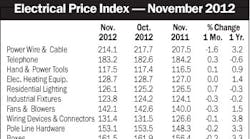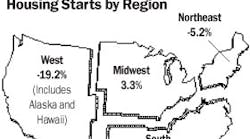“The state of manufacturing, the overall economy and the American worker are much better now than they were a year ago,” said Jerry Jasinowski, president of the National Association of Manufacturers.
Releasing the NAM’s annual Labor Day report, Jasinowski said manufacturing had been buffeted by a series of shocks in recent years — the terrorist attacks on 9/11, accounting scandals in 2002 and the buildup to the war in Iraq in 2003. “These shocks held back an economy struggling to emerge from recession,” Jasinowski said. “However, economic conditions have improved significantly over the past year.”
The NAM chief cited the optimistic consumer as a bellwether of a strengthening economy. “Consumer confidence is up 38 percent while real disposable incomes have increased by a solid 3.6 percent,” he said. “Factor in low interest rates and tax incentives to encourage business expansion and the result is solid growth. Business investment on equipment and software has increased by 14 percent over the past year — the fastest pace in half a decade.”
Jasinowski said improving international conditions also are helping lift the economy. “Foreign GDP growth is accelerating while the value of the dollar has fallen by 10 percent, making U.S. exports more competitive,” he said. “Exports have surged 10.5 percent over the past four quarters — the fastest pace in seven years.
“As a result, the economy has risen by 4.7 percent over the past year, 30 percent faster than the average pace of economic growth during the 1992-2000 expansion,” Jasinowski said. “At the same time, manufacturing output has increased by 5.8 percent — the fastest pace in seven years.”
Jasinowski said job creation in manufacturing was weaker than in previous recoveries primarily because very strong productivity growth has enabled companies to meet growing demand with fewer additional workers. “While overall business output is growing 50 percent faster than in 1992, the first year of the last employment recovery, productivity growth is growing close to 200 percent faster,” Jasinowski said. “We are seeing some job growth in manufacturing, mostly in computers, machinery and fabricated metals. The turnaround in exports and business investment has had the greatest effect to date on these industries, since machinery and computer equipment make up a large percentage of both U.S. exports and business investment.”
Jasinowski said the biggest impediment to job creation in the U.S. is excess costs associated with health care, litigation, energy prices, regulations and taxes. “All told, these excess costs add more than 22 percent to the cost of labor in this country compared to our nine major trading partners. “Until we get these costs under control, job creation will be less than it could be.”
Looking ahead, the NAM report said the nature of the current economic recovery bodes well for manufacturing in the near term. “The fundamentals point to a continued recovery in export growth (11 percent), business investment (12 percent), and solid consumer spending (3.5 percent) in the year ahead,” Jasinowski said. “Together, this will propel the economy forward at a healthy pace of 4 percent over the coming year.
“Manufacturers will likely add 350,000 workers to employment rolls over the coming year,” Jasinowski said. “Overall employment will increase by 2.3 million, and the unemployment rate should fall modestly to 5.2 percent this time next year.”

